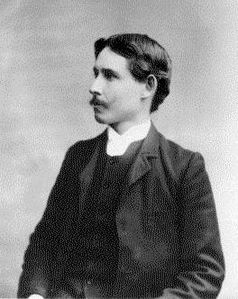At The Ferry
Archibald Lampman 1861 (Upper Canada) – 1899 (Ottawa, Canada)
On such a day the shrunken stream
Spends its last water and runs dry;
Clouds like far turrets in a dream
Stand baseless in the burning sky.
On such a day at every rod
The toilers in the hay-field halt,
With dripping brows, and the parched sod
Yields to the crushing foot like salt.
But here a little wind astir,
Seen waterward in jetting lines,
From yonder hillside topped with fir
Comes pungent with the breath of pines;
And here when all the noon hangs still,
White-hot upon the city tiles,
A perfume and a wintry chill
Breathe from the yellow lumber-piles.
And all day long there falls a blur
Of noises upon listless ears,
The rumble of the trams, the stir
Of barges at the clacking piers;
The champ of wheels, the crash of steam,
And ever, without change or stay,
The drone, as through a troubled dream,
Of waters falling far away.
A tug-boat up the farther shore
Half pants, half whistles, in her draught;
The cadence of a creaking oar
Falls drowsily; a corded raft
Creeps slowly in the noonday gleam,
And wheresoe'er a shadow sleeps
The men lie by, or half a-dream,
Stand leaning at the idle sweeps.
And all day long in the quiet bay
The eddying amber depths retard,
And hold, as in a ring, at play,
The heavy saw-logs notched and scarred;
And yonder between cape and shoal,
Where the long currents swing and shift,
An aged punt-man with his pole
Is searching in the parted drift.
At moments from the distant glare
The murmur of a railway steals
Round yonder jutting point the air
Is beaten with the puff of wheels;
And here at hand an open mill,
Strong clamor at perpetual drive,
With changing chant, now hoarse, now shrill,
Keeps dinning like a mighty hive.
A furnace over field and mead,
The rounding noon hangs hard and white;
Into the gathering heats recede
The hollows of the Chelsea height;
But under all to one quiet tune,
A spirit in cool depths withdrawn,
With logs, and dust, and wrack bestrewn,
The stately river journeys on.
I watch the swinging currents go
Far down to where, enclosed and piled,
The logs crowd, and the Gatineau
Comes rushing from the northern wild.
I see the long low point, where close
The shore-lines, and the waters end,
I watch the barges pass in rows
That vanish at the tapering bend.
I see as at the noon's pale core-
A shadow that lifts clear and floats-
The cabin'd village round the shore,
The landing and the fringe of boats;
Faint films of smoke that curl and wreathe,
And upward with the like desire
The vast gray church that seems to breathe
In heaven with its dreaming spire.
And there the last blue boundaries rise,
That guard within their compass furled
This plot of earth: beyond them lies
The mystery of the echoing world;
And still my thought goes on, and yields
New vision and new joy to me,
Far peopled hills, and ancient fields,
And cities by the crested sea.
I see no more the barges pass,
Nor mark the ripple round the pier,
And all the uproar, mass on mass,
Falls dead upon a vacant ear.
Beyond the tumult of the mills,
And all the city's sound and strife,
Beyond the waste, beyond the hills,
I look far out and dream of life.
Font size:
Submitted on May 13, 2011
Modified on May 03, 2023
- 2:52 min read
- 65 Views
Quick analysis:
| Scheme | ABABCDCD BEFEGHGH FIFIAJAJ KLKLAMAM JNJNGOXO PQPQGRGR STSTUXUX XVUVXWXW KXKXYFYX ZCZX1 2 1 2 3 X3 X4 5 4 5 |
|---|---|
| Closest metre | Iambic tetrameter |
| Characters | 3,010 |
| Words | 570 |
| Stanzas | 11 |
| Stanza Lengths | 8, 8, 8, 8, 8, 8, 8, 8, 8, 8, 8 |
Translation
Find a translation for this poem in other languages:
Select another language:
- - Select -
- 简体中文 (Chinese - Simplified)
- 繁體中文 (Chinese - Traditional)
- Español (Spanish)
- Esperanto (Esperanto)
- 日本語 (Japanese)
- Português (Portuguese)
- Deutsch (German)
- العربية (Arabic)
- Français (French)
- Русский (Russian)
- ಕನ್ನಡ (Kannada)
- 한국어 (Korean)
- עברית (Hebrew)
- Gaeilge (Irish)
- Українська (Ukrainian)
- اردو (Urdu)
- Magyar (Hungarian)
- मानक हिन्दी (Hindi)
- Indonesia (Indonesian)
- Italiano (Italian)
- தமிழ் (Tamil)
- Türkçe (Turkish)
- తెలుగు (Telugu)
- ภาษาไทย (Thai)
- Tiếng Việt (Vietnamese)
- Čeština (Czech)
- Polski (Polish)
- Bahasa Indonesia (Indonesian)
- Românește (Romanian)
- Nederlands (Dutch)
- Ελληνικά (Greek)
- Latinum (Latin)
- Svenska (Swedish)
- Dansk (Danish)
- Suomi (Finnish)
- فارسی (Persian)
- ייִדיש (Yiddish)
- հայերեն (Armenian)
- Norsk (Norwegian)
- English (English)
Citation
Use the citation below to add this poem to your bibliography:
Style:MLAChicagoAPA
"At The Ferry" Poetry.com. STANDS4 LLC, 2024. Web. 25 Apr. 2024. <https://www.poetry.com/poem/3615/at-the-ferry>.



Discuss the poem At The Ferry with the community...
Report Comment
We're doing our best to make sure our content is useful, accurate and safe.
If by any chance you spot an inappropriate comment while navigating through our website please use this form to let us know, and we'll take care of it shortly.
Attachment
You need to be logged in to favorite.
Log In